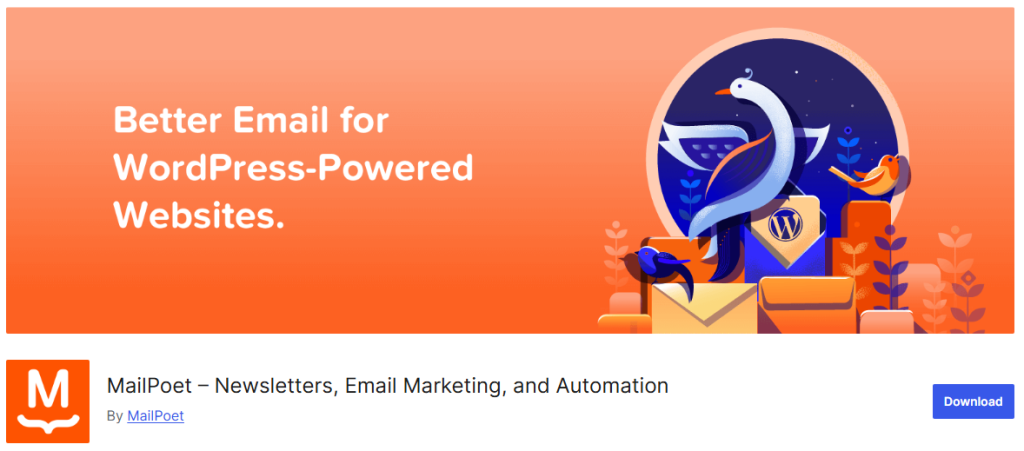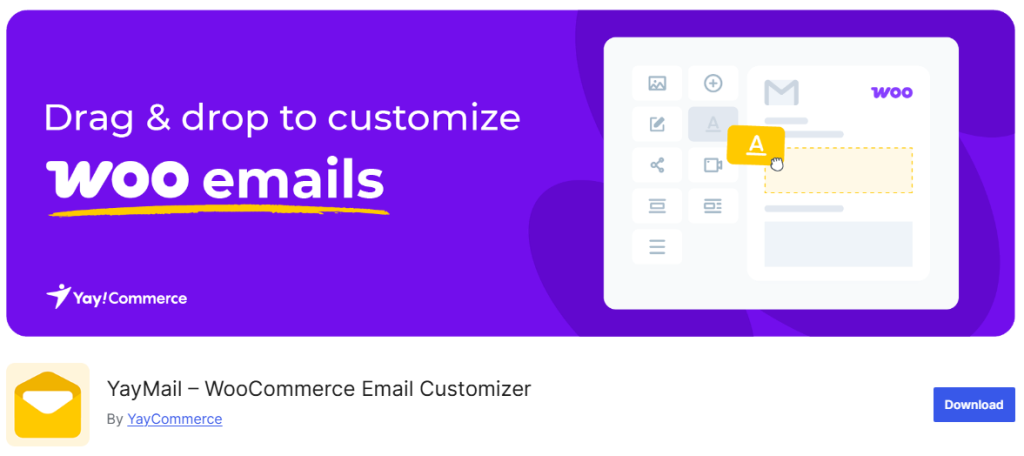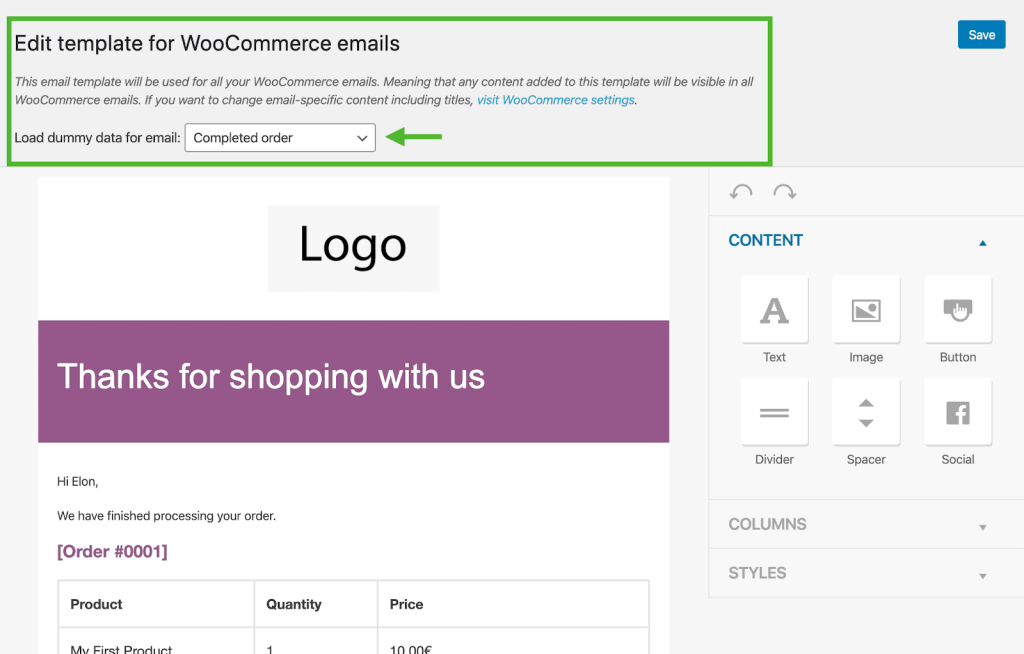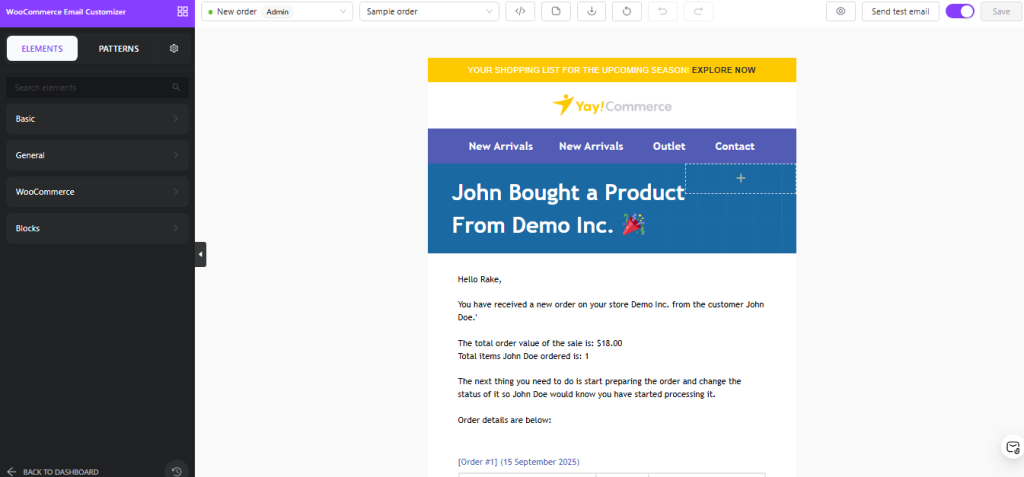Are you looking for the MailPoet and YayMail comparison? If you are, you’ve come to the right spot. In this post, we will outline what you can expect from both plugins and help you determine which one to choose.
When running a WooCommerce store, email communication plays a vital role in customer engagement and retention.
Choosing the right plugin to manage and customize emails can directly impact sales and user experience.
MailPoet and YayMail are two popular options that serve different purposes, but both focus on improving how your store connects with customers.
In this comparison, we’ll break down their features, usability, and overall value to help you decide which plugin best suits your WooCommerce needs.
Before proceeding with the comparison, let’s examine MailPoet and YayMail to see what they have to offer.
MailPoet: An Introduction

MailPoet is a popular WordPress plugin designed to simplify email marketing directly from your WordPress site. It allows users to create, schedule, and send newsletters, welcome emails, and automated campaigns without relying on third-party platforms.
With built-in templates and an intuitive drag-and-drop editor, it helps customize emails that match your brand’s look and feel.
MailPoet also integrates smoothly with WooCommerce, making it easy to send order confirmations, abandoned cart reminders, and product updates. Beyond design, it provides subscriber management, analytics, and a reliable sending service to improve deliverability.
Whether you run a blog, an online store, or a membership site, MailPoet offers an all-in-one solution to manage email communication seamlessly.
YayMail: An Introduction

YayMail is a WordPress plugin built to customize and enhance WooCommerce email templates with ease.
It provides a user-friendly drag-and-drop email builder, allowing store owners to design professional, branded emails without touching code.
From order confirmations and shipping updates to customer account notifications, YayMail gives complete control over how WooCommerce emails look and feel. It also supports extensions and integrations, so you can add dynamic content, conditional logic, and advanced layouts.
With its live preview and intuitive interface, customizing emails becomes a straightforward process that saves time and improves communication.
YayMail is designed for businesses that want to strengthen customer trust and create a polished shopping experience through engaging WooCommerce emails.
MailPoet vs YayMail: The Ultimate Comparison
Choosing between MailPoet and YayMail depends on how well each plugin fits your workflow and website needs. To make the decision easier, we’ll compare them across several key factors that impact usability, performance, and value.
Here are the factors we will be comparing:
- Interface
- Ease of Use
- Add-ons
- Compatibility
- Performance Impact
- Support and Updates
- Pricing
Let’s see how it goes.
Interface and Ease of Use
Both tools offer seamless customization options.
MailPoet integrates seamlessly into the WordPress dashboard, allowing you to customize WooCommerce emails directly.
While the feature is functional, its design feels slightly outdated compared to modern builders. It gets the job done but may not appeal to users who want a polished, visual editor.

YayMail, on the other hand, shines with its drag-and-drop email builder. The interface closely resembles popular page builders like Elementor, so customizing WooCommerce transactional emails feels visual and straightforward.
Users can instantly see how their changes look in real-time, reducing guesswork.

Add-ons
Both MailPoet and YayMail offer useful add-ons that extend their functionality and improve your workflow.
MailPoet Add-Ons
- Abandoned Cart Emails
- First Purchase Emails
- Purchased This Product Emails
- Purchased in this Category Emails
- Whois SMTP for WordPress (Email sending infrastructure)
- Fluent Forms Connector for MailPoet
- Contact Form 7 Add-On
You can see more MailPoet add-ons here.
YayMail Add-Ons
- YayMail Conditional Logic
- YayMail Addon for WooCommerce Subscriptions
- YayMail Addon for Germanized for WooCommerce
- YayMail Addon for AutomateWoo
- YayMail Addon for Dokan
- YayMail Premium Addon for WooCommerce Bookings
- YayMail Addon for WooCommerce Gift Cards
- YayMail Premium Addon for Smart Coupons
You can see more YayMail add-ons from here.
Compatibility
Both MailPoet and YayMail are designed to work seamlessly within the WordPress ecosystem, but their areas of focus differ.
MailPoet integrates smoothly with most WordPress themes and plugins, particularly those used for email marketing and subscriber management.
It also works well with WooCommerce, enabling automated emails for store activities. YayMail, on the other hand, is specifically built for WooCommerce email customization.
It supports a wide range of WooCommerce add-ons and payment gateways, ensuring consistent email designs across different store functionalities without breaking compatibility.
Performance Impact
When choosing a plugin for your WordPress site, performance plays a vital role in maintaining speed and stability. Both MailPoet and YayMail are designed with lightweight code, ensuring they don’t add unnecessary load to your server.
MailPoet manages emails directly within WordPress, and while it introduces some background processes for scheduling and sending campaigns, its impact on performance remains minimal for most sites.
YayMail, on the other hand, focuses solely on customizing email templates, which requires far fewer resources and has almost no effect on page load times.
Neither plugin introduces heavy scripts or bloated features that would slow down your site. However, performance can still depend on your hosting environment and the number of active plugins you’re running.
Overall, both MailPoet and YayMail provide solid functionality without sacrificing website speed or efficiency, making them reliable choices for WordPress users concerned about site performance.
Support and Updates
MailPoet offers professional documentation, community forums, and priority support for premium users, ensuring quick resolutions to common issues.
The team consistently rolls out updates to patch vulnerabilities, improve features, and maintain compatibility with the latest WordPress versions.
YayMail also provides dedicated customer support and maintains a responsive ticket system for both free and premium users.
Its developers frequently release updates to keep up with WooCommerce changes and evolving WordPress standards. Both plugins show a strong commitment to continuous improvement and reliable assistance, giving users confidence that they will not be left behind.
Whether you prioritize newsletter management or email customization, having dependable support and timely updates ensures your site remains secure, functional, and aligned with best practices.
Pricing
Pricing is a primary concern when choosing a tool or any online product. Here is the pricing os both plugins. Both of them have a free version plugin available with limited features.
The premium version of MailPoet starts at $10 a month.
The premium version of the YayMail plugin starts at $59 a year for a single domain license. And if you are interested in a one-time purchase, you can get it for $199.
You can learn more about the pricing from here.
Pros and Cons
Now, let’s examine the pros and cons of both plugins.
MailPoet
| Pros | Cons |
|---|---|
| Built-in email marketing tools for WordPress | The free version has subscriber limits |
| Seamless integration with WooCommerce | Advanced features require premium |
| No need for third-party SMTP for small lists | Emails can impact site performance on shared hosting |
| User-friendly interface with pre-designed templates | Deliverability depends on the hosting setup |
| Easy automation for newsletters and campaigns | Fewer customization options compared to dedicated design plugins |
YayMail
| Pros | Cons |
|---|---|
| Drag and drop builder for WooCommerce emails | Requires a premium subscription for advanced integrations |
| Wide range of pre-built blocks for customization | May need another plugin for marketing emails |
| Easy integration with WooCommerce extensions | |
| Helps brand your store’s email communication | |
| Lightweight and user-friendly editor |
Frequently Asked Questions
Now, let’s see some frequently asked questions regarding this topic.
Can MailPoet and YayMail be used together in a WooCommerce store?
Yes, MailPoet handles email marketing, newsletters, and automation, while YayMail focuses on customizing WooCommerce transactional emails. They can complement each other without conflict.
Does YayMail replace the email sending features of MailPoet?
No, YayMail is a design and customization tool for WooCommerce emails, while MailPoet acts as an email sender and marketing automation plugin.
Which is better for designing WooCommerce order confirmation emails, MailPoet or YayMail?
YayMail is specifically built for designing WooCommerce transactional emails with a drag-and-drop editor, making it the better option for order confirmations.
Can MailPoet manage newsletters while YayMail customizes WooCommerce emails?
Exactly. MailPoet is perfect for sending newsletters, product updates, and promotional campaigns, while YayMail lets you fully control how WooCommerce order and account emails look.
Does YayMail support advanced email marketing features like MailPoet?
No, YayMail focuses on WooCommerce email templates. MailPoet offers advanced email marketing features like segmentation, automation, and detailed analytics.
Which plugin is easier to use for beginners: MailPoet or YayMail?
YayMail is easier for beginners who only want to customize WooCommerce emails, while MailPoet has a broader learning curve since it includes marketing and automation tools.
Conclusion
Both MailPoet and YayMail serve different but complementary purposes for WordPress and WooCommerce users.
MailPoet is ideal if you want a complete email marketing and newsletter solution with automation, subscriber management, and advanced analytics.
On the other hand, YayMail specializes in customizing WooCommerce transactional emails with a simple drag and drop editor, giving your store’s messages a professional and branded look.
Instead of seeing them as direct competitors, think of them as tools that can work together. By combining MailPoet’s powerful marketing features with YayMail’s design flexibility, you can enhance both your email campaigns and customer communication.
The choice depends on whether your focus is marketing outreach, email design, or both.
Now over to you.
Which plugin will you choose?
Let us know in the comments.
UIf you are looking for more useful content, feel free to check out our blog archive.



Leave a Reply